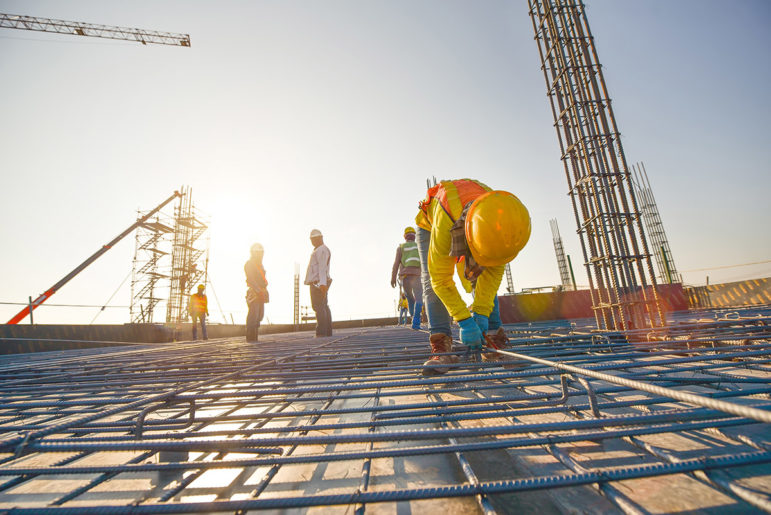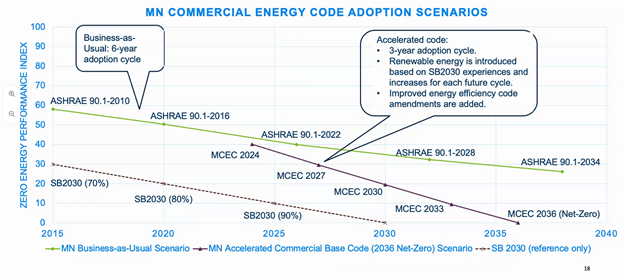
The energy efficiency baseline for new buildings in Minnesota is determined by a set of energy codes. The strength of these codes affects the energy consumption and carbon impact of these buildings for generations to come.
The first few months of 2021 have been exciting for Fresh Energy and our partners working to advance more progressive energy codes in Minnesota. We know that our state is currently not on track to meet its greenhouse gas reduction goals of 30% reduction from 2005 levels by 2025 and 80% reduction by 2050. But the good news is that energy efficiency in the building sector can play a crucial role in helping us get back on track and Minnesota leaders are taking action.
The new year has brought exciting developments both to the Minnesota legislature and to state agencies that work on adopting energy codes. As a primary nonprofit leader working to move the needle on climate through buildings policy, we are pleased to see this important issue moving to the forefront. The first is a bill working its way through the state legislature that would require new large multifamily buildings and commercial buildings to be net-zero by 2036 and the latter is an ongoing rulemaking process to adopt the 2019 ASHARE 90.1 commercial energy standard earlier that would help move us in the direction to the legislation prescribes.
Net-Zero by 2036
In December 2020, the Minnesota Departments of Labor and Industry and Commerce released a long-awaited report outlining recommended legislation to reduce the energy use in commercial and larger multifamily buildings. The recommendations in this report were shaped by a multidisciplinary stakeholder workgroup that convened October 2019 through January 2020 and included state agencies, commercial builders and designers, nonprofit builders, unions, and clean energy organizations – including Fresh Energy.
The “Improving building energy efficiency in commercial and multi-family construction” report outlined two key recommendations to include in legislation.
- Increase Minnesota’s adoption cycle for the commercial energy code from six years to three years which would mean Minnesota gets all the advantages of each new version of the model code.
- Put the state on a path to net-zero commercial buildings by 2036 (see chart below).

At the Minnesota legislature, State Representative Jamie Long, who participated in the workgroup, is carrying a bill (HF 831) based on the workgroup recommendations. At the first informational hearing of the bill in early February at the Energy and Climate Finance and Policy Division, Aditya Ranade, Deputy Commissioner at the Department of Commerce, outlined that this bill would reduce greenhouse gas emissions by an estimated 38,000 tons of carbon equivalent by 2025. In addition, testifiers in support included Richard Graves from the University of Minnesota’s Center for Sustainable Building Research, Cindy Steinhauser from the City of Rochester, Andy Snope representing IBEW Local 292, and Elizabeth Turner representing AIA-Minnesota. The bill passed through the Labor, Industry, Veterans and Military Affairs Finance and Policy Committee and was referred to the Climate and Energy Committee.
New Commercial Energy Standard
Meanwhile, the Minnesota Department of Labor and Industry has begun the process of updating Minnesota’s commercial energy code to the ASHRAE 90.1 model code (as amended), which would go into effect in 2022. The last commercial energy code was just adopted in 2020; read about it in our blog post here.
Minnesota statute currently outlines a six-year adoption cycle for the state commercial building code, including the energy provisions. However, this adoption schedule has proven to be too slow. A quicker adoption schedule aligns with the pathway outlined in the aforementioned report’s recommendations to reach new zero by 2036.
Fresh Energy serves on the technical advisory group (TAG) for the Department of Labor and Industry’s process and will push for all cost-effective efficiency and decarbonization measures to be included in the TAG’s recommendations.
What’s Next
A new commercial energy standard, in tandem with the advanced commercial energy code bill at the Minnesota legislature, will go a long way to help Minnesota meet its carbon reduction goals and stay on track to meet the goal of net-zero commercial buildings by 2036. Fresh Energy is your energy efficiency champion and will continue to play a key role and provide expert comment and testimony throughout the process.
